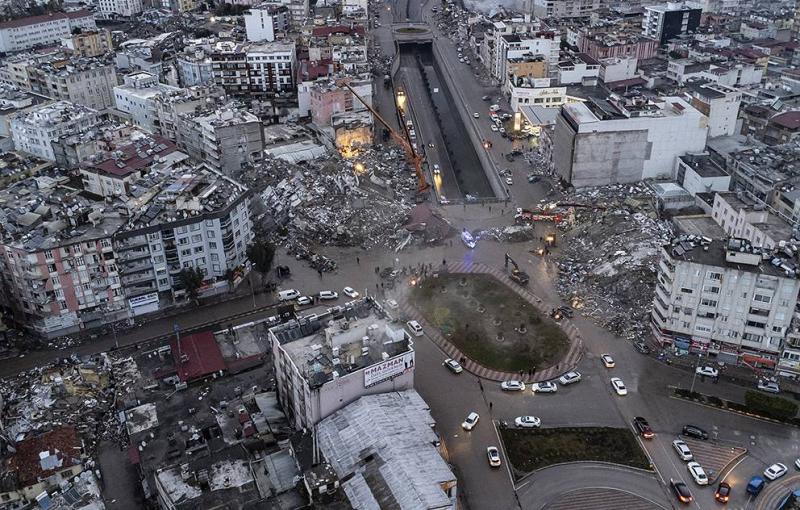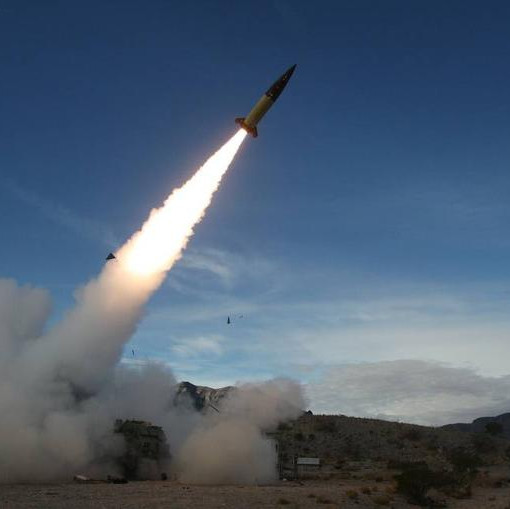
© EPA-EFE/ERDEM SAHIN/TASS
Top stories from the Russian press on Tuesday, February 7th, prepared by TASS
Post-earthquake relief efforts in Turkey and Syria may help resolve regional conflicts, Moscow and Baghdad seek to abandon the dollar in bilateral trade and the US plans to slap a huge tariff on Russian aluminum. These stories topped Tuesday’s newspaper headlines across Russia.
Vedomosti: Post-quake relief efforts in Turkey, Syria may help resolve regional conflicts
A major earthquake struck southeastern Turkey and northern Syria on February 6. The epicenter was not far from the Turkish city of Gaziantep, while in Syria, both government-controlled areas and the Idlib province, occupied by the pro-Turkish armed opposition, were affected. Russia announced assistance to Damascus and Ankara, Vedomosti notes.
It is too early to predict whether the natural disaster could accelerate efforts to improve relations between Turkey and Syria, which have been in the works since late 2022, Russian International Affairs Council expert Kirill Semenov pointed out. According to him, the two countries will probably coordinate their rescue activities and assistance to the population but it’s hard to say to what extent. The earthquake may trigger a new wave of migration from Syria to Turkey because Idlib and northern Aleppo have suffered great damage. This will be a problem for the Turkish authorities but it may also turn out to be an area of possible coordination between Turkey and Syria, Semenov said.
In the East, such tragedies always bring those affected closer, said Amur Gadzhiyev, a researcher at the Russian Academy of Sciences’ Institute of Oriental Studies. In his view, the residents of the quake-stricken regions will naturally try to help each other. Moreover, these kinds of grassroots initiatives are likely to be supported at the governmental level. Gadzhiyev believes that politically, the earthquake will foster mutual understanding between Ankara and Damascus, speeding up the process of rapprochement.
As for Syrian-Turkish relations, there likely will be a "humanitarian hiatus" and the standoff in border areas will ease but the situation will not be crucial in terms of settling relations, Senior Lecturer at the Higher School of Economics’ School of Asian Studies Andrey Zeltyn said. A political rapprochement is more likely to be facilitated by the fact that the interests of Ankara and Damascus overlap in northern Syria, as was proved by the intensified negotiation process in late 2022.
Izvestia: Lavrov discusses international trade in Baghdad
Moscow and Baghdad plan to switch to using the currencies of "reliable countries" to pay for oil supplies in order to get away from the dollar in bilateral economic relations, Russian Foreign Minister Sergey Lavrov announced following talks with his Iraqi counterpart Fuad Hussein in Baghdad, Izvestia writes.
Iraq, which was in the midst of a war against terrorists a few years ago, is now going through political crises. In July 2022, the country’s parliament managed to agree on a new prime minister but after that, protests broke out in the capital again.
Orientalist scholar Andrey Ontikov explained that the country is now about to see more protests as a result of the United States’ actions. In late 2022, Washington imposed a number of restrictions on cross-border dollar payments from Iraq. The country’s media estimated that the ban affected almost 80% of transactions. The Americans justified the move by saying they needed to ensure compliance with sanctions imposed on certain countries.
"Of course, this is more about Iran. Presumably, Tehran used various Iraqi commercial banks to circumvent US sanctions and now they have been denied this opportunity. The move also struck a blow to Baghdad’s economy as the national currency dropped by nearly ten percent. Disgruntled people are already protesting in front of the Central Bank’s building. However, it’s difficult to say whether this will result in a full-fledged crisis," Ontikov noted.
According to him, Iraqi experts have long been discussing the feasibility of maintaining the dollar’s dominance in payments and the prospects for using other countries’ currencies - namely China’s yuan and the UAE's dirham - as an alternative.
Russia is now under similar sanctions as Iran. Hence why Moscow and Baghdad are also interested in boosting trade relations independent of the dollar.
Nezavisimaya Gazeta: Beijing hopes to influence Taiwanese presidential election
Taiwan’s Kuomintang opposition party is trying to ease tensions amid China’s military exercises around the island. The party’s Deputy Chairman Andrew Hsia has set off on a trip to mainland China to meet with the Taiwan Affairs Office’s head. Experts say that China is not yet ready to challenge Washington, which has been arming the island, Nezavisimaya Gazeta notes.
The Kuomintang traditionally favors close ties with China, while categorically denying that it has become a pro-Beijing party. Andrew Hsia visited China last August after Beijing, angered by US House of Representatives Speaker Nancy Pelosi’s trip, conducted a whole series of military drills near the island. The Kuomintang justified Hsia’s visit by pointing out that lines of communication with China should remain open. This is what the administration of incumbent Taiwanese President Tsai Ing-wen wants, too, but Beijing views Tsai as a separatist. Complicating the picture is the fact that Taiwan is expected to hold its presidential election in 2024.
Scientific Director of the Russian Academy of Sciences’ Institute of China and Contemporary Asia Alexander Lukin noted that "China probably hopes that the Kuomintang will come to power." "The party adheres to the consensus, or the tacit agreement China and Taiwan made in the early 1990s, that they are both parts of a single China. The Democratic Progressive Party rejects this consensus, claiming that Taiwan is an independent country. That is why China is more willing to speak with the Kuomintang, since its position is a bit closer to China’s, though it doesn’t align with Beijing’s stance. Beijing’s consent to allow Andrew Hsia’s visit is essentially an act of support for the opposition party," the analyst explained.
"As for China’s plans to use force, it has always said that it prefers a peaceful option but could also use force. However, Beijing is unlikely to launch such an operation in the near future. If there is anything that the Chinese have learned from Ukraine’s example, it is to use caution," the expert stressed.
Media: US plans to slap restrictive tariff on Russian aluminum
The United States has abandoned the idea of secondary sanctions on Russia’s Rusal aluminum producer, deciding on a 200% tariff on Russian aluminum instead, which is the most benign option for the global market. This will put a full stop to Russian supplies to the US but, according to analysts, Rusal will be able to redirect the small volumes that used to be supplied to North America to Asian markets, Kommersant notes.
"Statistics show that China increased Russian aluminum imports by 48% in December 2022 compared to the same period in the previous year," Alfa Bank’s Boris Krasnozhenov said. In 2022, Russia exported $1.3 bln worth of aluminum to China, up from $800 mln in 2021.
Sergey Grishunin from the National Rating Agency believes that aluminum exports won’t decline dramatically because in 2018, Rusal demonstrated its ability to diversify export flows. Meanwhile, the analyst is concerned that by announcing such plans, the US is trying to provoke the European Union into adopting a prohibitive duty. In such a case, 1.2 mln metric tons of aluminum supplies will be at risk.
Leading Analyst at Veles Capital Vasily Danilov, in turn, told Vedomosti that the company would redirect supplies to Asia. However, Danilov emphasizes that Rusal’s supplies to the US accounted for just 0.4% of the world’s aluminum production so this redirection would not have much impact on the global aluminum market.
In 2021, the company earned 6% of its total revenue from aluminum supplies to the US but now, that share is likely even lower or near zero, the Sinara investment bank’s senior metallurgy and mining analyst Dmitry Smolin noted. "The introduction of a 200% import tariff would be primarily a political gesture by Washington toward Moscow," Smolin concluded.
Media: Russia ranks fourth in gold and foreign currency reserves
Russia is among the world’s top four countries in terms of gold and foreign currency reserves based on an analysis of data from national central banks. Russia’s reserves stand at $582 bln, while the top three include China ($3.31 trillion), Japan ($1.27 trillion) and Switzerland ($924 bln), Izvestia writes.
Russia maintains a high level of international reserves despite unprecedented economic restrictions, said Artyom Klyukin, an expert at the Iva Partners investment company. "This makes it clear that the country does not have to actively sell foreign currency to ensure financial stability and fill the domestic market, which is guaranteed by the high level of exports and a slight drop in imports. However, the thing to remember is that more than half of Russia’s international reserves were illegally frozen in EU and G7 countries, so if the need arises, the country won’t be able to promptly use them," the analyst noted.
"The accumulation of gold reserves increases the country’s financial stability because liquid asset reserves can be sold on the market to friendly countries if necessary. But as far as investment attractiveness goes, I would treat gold with caution. Oftentimes, gold behaves the way risky assets do, rising and falling with the market, which reduces its value as a savings tool," said Alexander Abramov, head of the laboratory for institution and financial market analysis at the Russian Presidential Academy of National Economy and Public Administration.
"For Russia under sanctions, gold has become an alternative in a situation where dollar and euro reserves are blocked by the West. That is why gold reserves started to grow last year," private investor and founder of the School of Practical Investment Fyodor Sidorov told Rossiyskaya Gazeta. "Unlike investing in foreign currencies (held by the countries that the currencies belong to, which is an international financial rule), gold is held in Russia," the expert noted.









